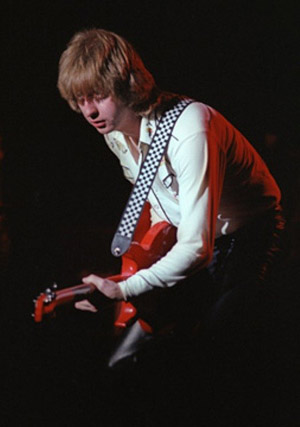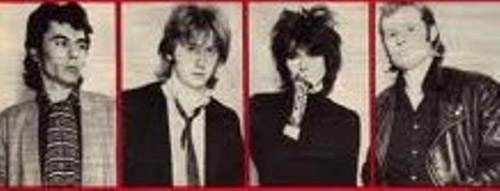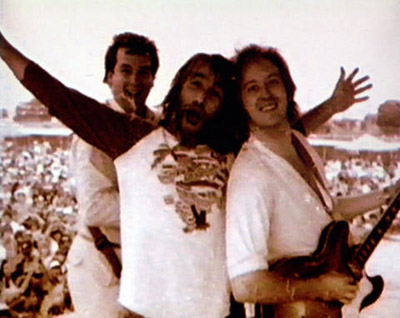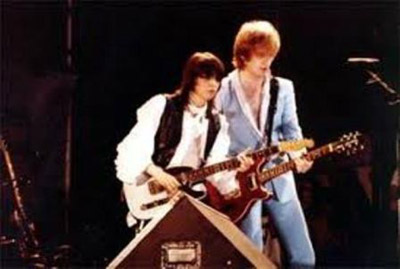JAMES HONEYMAN-SCOTT

Live Fast, Play Hard, Die Young
by Shelbie Freedman
(February 2014)
This June 16th will mark the 32nd anniversary of the passing of a great but unsung guitar hero, James Honeyman-Scott. His now commonplace, but nonetheless mind-blowing riffs, a la "Tattooed Love Boys," which The Edge now rips off on many U2 albums, began with some off-the-cuff and ballsy playing by Mr. Scott. There is Jimmy Scott's ringing jangle in "Kid," which Johnny Marr used as warm-up material. When first recorded in 1979, Mr. Scott's work was both innovative and ground-breaking. "Back on the Chain Gang," worked on during sound checks during Jim's life, was subsequently recorded after Mr. Scott's death from heart failure brought on by cocaine intolerance in 1982, at the tender age of twenty-five. The song has the jangle and lightness typical of Jimmy Scott's work, a deceptive easy melody that belies a clever way with chords and an uncanny, almost instinctive, awareness of which notes blend together to give a song a magical touch. In "Mystery Achievement," for example, Jim could have taken a ten minute solo at the break. He could have made the song more about his own skills and abilities, he could have set out to simply impress the crowd with his skills, taken a decent song and turned into a showpiece for his guitar virtuoso, as done many times by his friend Eddie Van Halen, and other artists like the Allman Brother or Eric Clapton. Instead, Jim played for the song, often giving an unusual and unexpected solo, like the country-tinged masterpiece in "Kid" (a song which he arranged, although all writing credit went to Chrissie Hynde) or the dive bomb at the end of "Day after Day." Jimmy Scott's talent has been acknowledged by rock legends as diverse as Elvis Costello and Jackson Browne, who wrote "For a Rocker" to Mr. Scott after his death.

Pretenders' fan come in two varieties- those who think that Chrissie Hynde rules the roost, that all songs are her sole brain child, and that any musician standing behind her is just that, a musician who backs up her genius, and who merely follows her lead and makes her magic come alive according to her directives. They are second bananas, nothing more. Other fans think that undoubtedly Ms. Hynde is vastly talented, but that her greatest work came during Jim Scott's all too short tenure with the band. I am of the second variety of Pretenders' fan. The first two albums, Pretenders & Pretenders II, along with an EP released between the two albums in 1981, are brilliant pieces of musicianship, and to my mind, the magical brain child of Ms. Hynde's biting lyrics and Jimmy Scott's inherent musical talent. If you listen to the first two albums, you hear something that was a cross between the punk Movement, of which Ms. Hynde was a member of good standing, and the pure pop cleverness of ABBA or the Beach Boys, of whom Mr. Scott was a devoted fan, even playing with the band in May of 1982, weeks before his death.

Ms. Hynde went on, after Jimmy Scott's death, to produce excellent songs, but to me and to fans of the original Pretenders' line-up, her later work like "Stand by Me" lacked the oomph and the innovative qualities of "The Adulteress" or "The Phone Call." It was fairly run of the mill classic rock radio fare, but not ground-breaking and certainly not reminiscent of the angry punk that marked Ms. Hynde's early years in the record business. Jim took Ms. Hynde's lyrics and gave them a twist, an unexpected drive and rhythm that matched her snarling vocals note for note. In a 1981 Guitar Player interview, Jim recalls the early days of the band, where they rehearsed "day and night," and of how he took Ms. Hynde's punk sensibilities and added melody. "Up the Neck" started as a reggae song until Jim suggested that the band speed up the song, and then added its distinctive riffs along the way, making it the iconic song loved by Pretenders' fans today, thirty-odd years on. His music has withstood the test of time, and has not become dated or passé. Ms. Hynde has given Jim his due, calling him her "right-hand man" (although I respectfully insist that she was his), and acknowledged that he "brought out the melody in me." Indeed, Ms. Hynde has stated that Jimmy Scott "was the Pretenders' sound." And he took that sound with him to his early grave, as he walked with eye wide open into the most clichéd rock ending of all, a drug overdose, leaving the band decimated and lacking his eye for placing the right riff in the right place. The abundant cocaine, free-loving groupies, exotic travel, endless parties galore and high-profile celebrity friends from the Canyon are the right of any up and coming rock legend, but in the end, dying at twenty-five in some strange girl's flat has no glory, and rings hollow to me.

Jimmy Scott grew up in Hereford, England and taught himself guitar at an early age. His mother played Church standards on the piano every Sunday and Jim was graced with a year or so of piano lessons, of which he learned to play by ear to "fool the piano teacher." He was a natural talent, not the type that spent hours poring over chords, and was playing in 1974 with Verden Allen of Mott the Hoople fame in a local band, The Cheeks, when most of us were trying to get a date to the prom. He was recognized as an equal by axe men as legendary as Nils Lofgren, Bruce Springsteen and Pete Townshend, who was set to produce what would later become Learning to Crawl before Jimmy's untimely passing, and given one of Pete's Rickenbackers before his death.
The tragedy of Jimmy Scott's passing, aside from his young age, was the talent lost, and the possibilities left unfulfilled. What would the third Pretenders' album have sounded like if Jimmy had lived to infuse it with his talent? Songs like "Back on the Chain Gang" remain to tantalize, and live clips found on the Pirate Radio DVD serve to immortalize his live playing style, which was more free and wild than the stylized vinyl recordings. Jim left behind a short body of work which has almost been forgotten by most mainstream music magazines, leaving a few die-hard followers on Rickenbacker, Zemaitis or Hamer guitar forums.
A shame, to have such a raw and fearless player tossed to the waste heap of has-beens and never-weres. Ms. Hynde has built her early reputation on Jimmy Scott's often uncredited musical instincts, as he told her to keep her songs for herself and never clamored for the royalties that come with getting your John Hancock on a popular song. A modest man, which is a rarity in the world of over-inflated and pampered rock and roll egos. On June 16th, I'll blast "Tattooed Love Boys" and have a tall one for James Honeyman Scott.